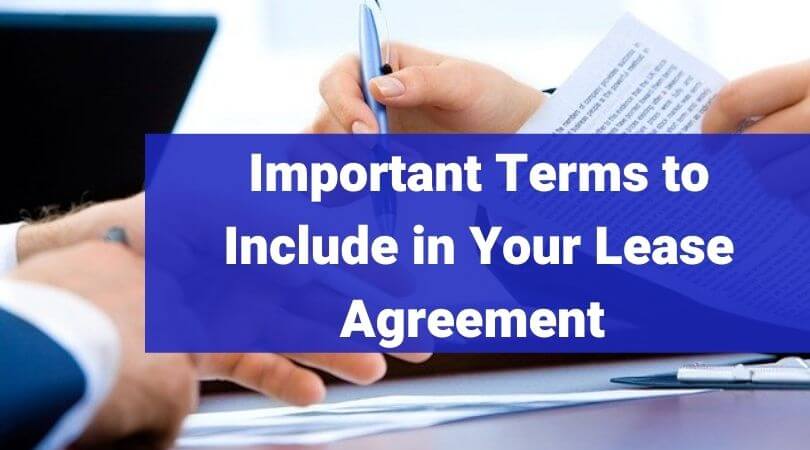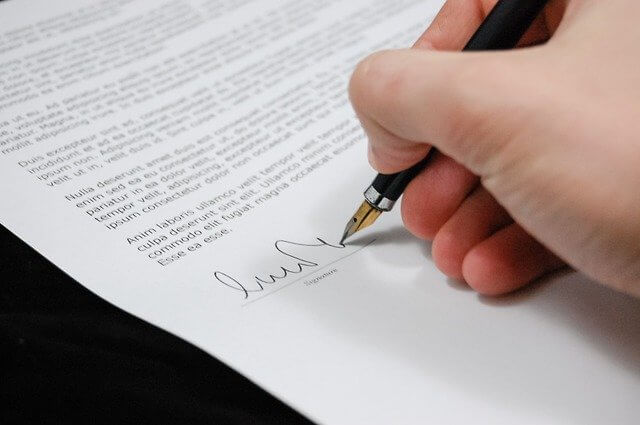
A lease or rental agreement is a legal contract between you and your tenant. It lays out the rights and responsibilities of landlords and renters alike. It should clearly enumerate the rules both of you agree to follow during the tenant’s stay.
A lease agreement also includes how long the tenant will occupy the property, and the monthly rent amount. Whether a lease agreement is short or long, it should cover all the essential leasing terms.
A detailed lease is of utmost importance for any property owner, particularly if you’re just getting started out as a landlord. Below are some of the crucial terms that you should cover in the lease agreement:
1. Names of All Adult Tenants
It’s essential to include the names of all the adults who will stay in the rental unit. They’ll also all need to sign the lease agreement. Once they sign the contract, they will be legally responsible for all the terms in the contract.
You should include the amount of rent to be paid monthly and the proper use of the property. If one of the tenants on the lease fails to pay rent, you’re legally allowed to collect rent from the other tenants. Moreover, if one tenant fails to abide by the agreement, you can terminate the tenancy of everyone on the lease.
2. Limits on Occupancy
Ensure your agreement states that the rental unit is only for those who have signed the lease agreement. This will include the tenant’s minor children. It’s essential to include this, to ensure you have the right to determine who lives in your property.
Ideally, only those who you have screened should stay in the rental unit. If your tenant allows a friend or relative to move in, this may be grounds for eviction. In the same way, if your tenant sublets your unit without your approval, you may want to consider eviction.
3. Terms of Tenancy
Your rental document should state if it’s a month-t0-month rental agreement or fixed-term lease. Month-to-month rental agreements are typically renewed each month. They typically self-renew until you or your tenant decide to end them.

On the other hand, a fixed-term lease usually lasts for a year. The agreement for fixed-term lease will include the options for the renewal. Generally, these terms will depend on you how long you want your tenant to stay and how much flexibility you want to give your tenant regarding the terms of the tenancy.
4. Rental Amount
You should include the amount of rent in the lease agreement. You should also specify when rent is due, and how the tenant will pay. It’s important to lay out all the details to avoid confusion between you and your tenant. Make sure to include the following details:
- Acceptable methods of payment—whether you’ll allow checks or online payments.
- Late fees—whether you’ll charge late fees, how much they are, and if there’s a grace period.
- Additional Charges—if a tenant’s check bounces, for example.
5. Deposits and Fees
One frequent cause of conflict between landlords and tenants is the use and return of security deposits. To avoid conflict and confusion, make sure your lease agreement is clear about the following:

- Amount of the security deposit—make sure you comply with the state laws regarding the maximum amount.
- Use of security deposit—for example, if it can be used to pay for repairs.
- Details regarding the return of the security deposit—when and how you’ll return the security deposit when the tenant moves out, and how you’ll account for deductions.
- Legal non-returnable fees—cleaning costs, for instance.
In certain states, it’s legally require that you include where the security deposit will be held. In some circumstances, tenants are entitled to interest on their security deposits.
6. Repairs and Maintenance
One of best ways to protect yourself from property damage is by drafting a rock solid lease. To avoid landlord-tenant disputes, you should clearly state you and your tenant’s responsibilities regarding property maintenance and repairs. Be sure to include:

- The tenant’s responsibility for keeping the rental property clean and orderly. Mention whether they’ll have to pay for the damages they directly cause.
- The timeframe in which the tenant must inform you if there are defective or dangerous conditions. The agreement should also include the specific details of how you’ll handle complaints and requests for repairs.
- The restrictions on repairs and alterations a tenant may conduct. For example, the tenant may not be allowed to add a built-in dishwasher or install an alarm system.
7. Entry to the Rental Property
Your lease agreement should include your legal right to visit the property. For example, mention whether you’ll drop by to check on the property or make repairs. The lease should also include how much advance notice you should give before a visit. Doing so will ensure that your tenant doesn’t sue you for illegal entry or violation of privacy rights.
8. Restrictions on Illegal Activity in the Property
Your agreement should include a clause that doesn’t allow excessive noise that can disrupt the neighbors. It should also restrict illegal activity, such as drug dealing. Doing so will prevent your property from damage and will help protect you from receiving lawsuits from neighbors.
9. A Pet Agreement
Your leases should indicate whether or not you allow pets. If you do allow pets, you should specify if there are any restrictions.

You’ll likely want to set limits on a pet’s size, and the number of pets. You’ll also want to require that your tenants keep the yard free from animal waste.
Other Important Restrictions
Make sure that your lease agreement complies with all other relevant laws. Examples of relevant laws include health and safety codes, rent control ordinances, and occupancy rules.
Be sure to remain compliant with anti-discrimination laws and state laws. For example, state laws may set limits on the security deposit, or may give tenants the right to sublet the property.
You need to lay out all legal restrictions in the lease agreement. Having a clear, detailed lease agreement will ensure fewer landlord-tenant disputes, particularly during a global pandemic, which can further complicate rights and responsibilities. It will also protect you from receiving lawsuits from tenants.